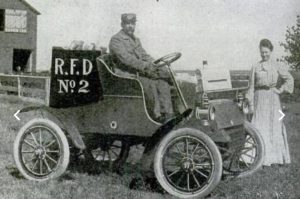 Imagine being a mail carrier between 1863 and 1922. I’m sure that you are wondering why those dates would be so important. Well, they really are. In 1863, the United States Postal Service began what they called Free City Delivery. This service brought about the beginning of home delivery of the mail, at least in the cities. I suppose it also brought on the need for the mail carrier. What it didn’t bring with it was a large degree of efficiency. The mail carrier was required to go to the door of the patron receiving mail, and knock. Then they waited patiently for someone to answer the door to take the mail. That is about the strangest idea to me. The person would either need to be home every day at the time the mail carrier was supposed to be
Imagine being a mail carrier between 1863 and 1922. I’m sure that you are wondering why those dates would be so important. Well, they really are. In 1863, the United States Postal Service began what they called Free City Delivery. This service brought about the beginning of home delivery of the mail, at least in the cities. I suppose it also brought on the need for the mail carrier. What it didn’t bring with it was a large degree of efficiency. The mail carrier was required to go to the door of the patron receiving mail, and knock. Then they waited patiently for someone to answer the door to take the mail. That is about the strangest idea to me. The person would either need to be home every day at the time the mail carrier was supposed to be 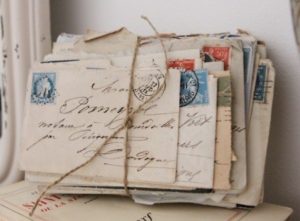 there, or somehow know the date something was coming…an impossible task in those days, or have someone else there to watch for the carrier. It was estimated that the carriers lost over 1.5 hours a day, waiting on the patrons to come to the door.
there, or somehow know the date something was coming…an impossible task in those days, or have someone else there to watch for the carrier. It was estimated that the carriers lost over 1.5 hours a day, waiting on the patrons to come to the door.
As early as 1880, the post office began to suggest that people put a letter box on their door, so that the mail could be left at the house, even if no one was home. The Post Office wanted wall-mounted mailboxes to the outside of the houses instead of mail slots. They wanted them to be mounted at the height of a standing man. The plan was that the carrier would not have to bend over to deposit mail, and the outgoing mail would stay dry. People are notoriously slow to accept change, and I’m sure this situation was no different.
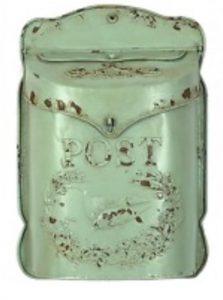
By 1916, with little change in the situation, the post office began working on a plan to achieve the compliance they needed. The deadline was set. The homes were to have a letter box by March 20, 1922. After that date, the mail would be held at the post office, if no letter box was in place. As we look back now, it seems strange to think that anyone would fight the letter box plan. It’s such a simple way to get your mail, and it does not involve a daily trip to the post office. I can’t imagine why anyone would want the hassle that not having a mail box at your home would bring. I think they probably felt same way after they had one for a while.
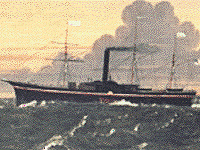 The San Francisco gold rush was a crazy time in American history. It was almost giddy in many ways. Gold does funny things to people. Just the thought of striking it rich made people pull up stakes and move west to try their hand at gold mining. Once people had made their fortunes, many decided to head back home to the east. Apparently the idea of wagon training back was not so appealing on the journey home, so these now, people of wealth decided to go by ship. The easiest crossing was through the Panama area. Of course, the Panama Canal was not built yet, although the French had tried to do so, but it wasn’t done yet. So the trip became a two ship journey.
The San Francisco gold rush was a crazy time in American history. It was almost giddy in many ways. Gold does funny things to people. Just the thought of striking it rich made people pull up stakes and move west to try their hand at gold mining. Once people had made their fortunes, many decided to head back home to the east. Apparently the idea of wagon training back was not so appealing on the journey home, so these now, people of wealth decided to go by ship. The easiest crossing was through the Panama area. Of course, the Panama Canal was not built yet, although the French had tried to do so, but it wasn’t done yet. So the trip became a two ship journey.
On August 20, 1857, several hundred passengers in San Francisco boarded the SS Sonora, of the Pacific Mail Steamship Line, and headed south toward Panama City. The 1857 value of the gold on board was 1.6 million, so just imagine today’s value. Thousands of freshly minted 1857-S double eagles, some earlier $20 coins, ingots, and gold in other forms were among the treasures. Some of the double eagles were stacked in long rows or columns and nestled in wooden boxes. Elsewhere around the ship, passengers had their own stash in purses and boxes reflecting their success in the land of gold. Once they arrived in Panama City, they were transported by train to on the Panama Railroad, which was a 48-mile line, completed in 1855 and had facilitated the crossing of the isthmus in about three or four hours as opposed to paddling and tramping through the jungles for several days. When the train arrived in Aspinwall, the passengers disembarked, and the treasure was transported to storage.
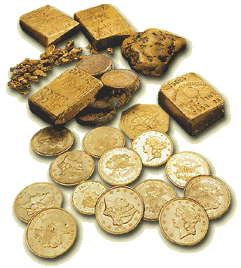 The next leg of the trip was aboard the side-wheel steamer SS Central America. The ship had been called the SS George Law, but the name was later changed to the SS Central America. It was now on its forty-fourth voyage for the Atlantic Mail Steamship Company. The Atlantic Mail Steamship Company was operating under federal mail contract to provide mail to the people between the east and west. The steamers had Navy captains at the helm, men of proven reputation and experience. Capt. William Herndon commanded the Central America.
The next leg of the trip was aboard the side-wheel steamer SS Central America. The ship had been called the SS George Law, but the name was later changed to the SS Central America. It was now on its forty-fourth voyage for the Atlantic Mail Steamship Company. The Atlantic Mail Steamship Company was operating under federal mail contract to provide mail to the people between the east and west. The steamers had Navy captains at the helm, men of proven reputation and experience. Capt. William Herndon commanded the Central America.
In early September 1857, the gold treasure was carefully packed aboard. The passengers found their cabins, and all were ready for the pleasant voyage to New York City. It was an ideal time of year for travel. A few days later, on September 7, 1857, the ship docked in the harbor of Havana. It was a popular stop for the passengers, who set about buying souvenirs and exploring the sights of the town. The trip toward New York continued to be pleasant. The skies were sunny and the sea smooth…temporarily.
At 5:30am on Wednesday, September 9, the ship’s second officer noted that the ship had gone 286 nautical miles in the preceding 26½ hours. He noted that a breeze was kicking up, and perhaps they were in for a storm, but expressed no concerns, because they were experienced and could handle a storm should it occur. That would prove to be the first mistake made. The storm grew furious and they were too far from a port to do much except keep the SS Central America into the waves. By Friday morning, September 11, the crew was still in control, but the ship was taking on water through the drive shaft, broken or open lights and elsewhere. The ship was tossing violently. It was virtually impossible to feed coal into the boilers.
At 11am Captain Herndon told the passengers that the ship was in grave danger. He enlisted the help of all men to bail water with a bucket brigade. By 1:00 in the afternoon the rising water in the hold doused the boiler 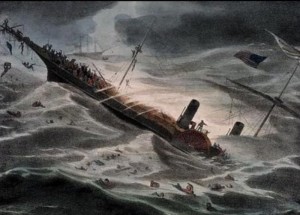 fires. The ship’s paddlewheels stopped. The SS Central America was at the mercy of the sea. By Saturday, the 12th of September, 1857, the storm started to pass, but it was too late. The SS Central America was doomed. The people were told to abandon ship, and the SS Central America went down with all of their treasure. In all, 425 lives were lost to the sea. Only 153 were pulled from a watery grave by the brig Marine, which was also damaged by the storm, though not to the degree of the SS Central America. The ship was discovered again on September 11, 1988, almost exactly 131 years after she went down in a hurricane on September 12, 1857. It was a rich find for Thomas G Thompson and his crew…and the museums who would reap much of the benefits.
fires. The ship’s paddlewheels stopped. The SS Central America was at the mercy of the sea. By Saturday, the 12th of September, 1857, the storm started to pass, but it was too late. The SS Central America was doomed. The people were told to abandon ship, and the SS Central America went down with all of their treasure. In all, 425 lives were lost to the sea. Only 153 were pulled from a watery grave by the brig Marine, which was also damaged by the storm, though not to the degree of the SS Central America. The ship was discovered again on September 11, 1988, almost exactly 131 years after she went down in a hurricane on September 12, 1857. It was a rich find for Thomas G Thompson and his crew…and the museums who would reap much of the benefits.
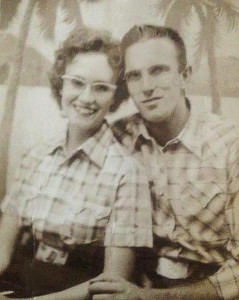 Life is strange sometimes. It’s pathways intertwine with the lives of different people as the journey takes us to this place and that place along life’s road. I have been amazed at how many times my life has crossed paths with different people who would become a part of my family down the road. Such was the case with my Uncle Jack McDaniels. My mother-in-law, Joann Schulenberg had done a lot of sewing for Uncle Jack’s mother, and then my father-in-law worked with Uncle Jack at Casper Concrete. In the middle of all this, Uncle Jack married my Aunt Bonnie on February 14, 1959, and became my uncle. Then I married Bob and the circle completed. It was kind of cool to know that our lives were all intertwined that way, because of how much the different people in in that circle have meant to me.
Life is strange sometimes. It’s pathways intertwine with the lives of different people as the journey takes us to this place and that place along life’s road. I have been amazed at how many times my life has crossed paths with different people who would become a part of my family down the road. Such was the case with my Uncle Jack McDaniels. My mother-in-law, Joann Schulenberg had done a lot of sewing for Uncle Jack’s mother, and then my father-in-law worked with Uncle Jack at Casper Concrete. In the middle of all this, Uncle Jack married my Aunt Bonnie on February 14, 1959, and became my uncle. Then I married Bob and the circle completed. It was kind of cool to know that our lives were all intertwined that way, because of how much the different people in in that circle have meant to me.
Uncle Jack was most in his element when he was at his place out in the country, along the Platte River. He loved to tinker around in his shop, and then take walks down the lane to get the mail, or just to enjoy nature. I’m sure he spent time fishing down at the river, and watching all the different wildlife that wandered around in the area.
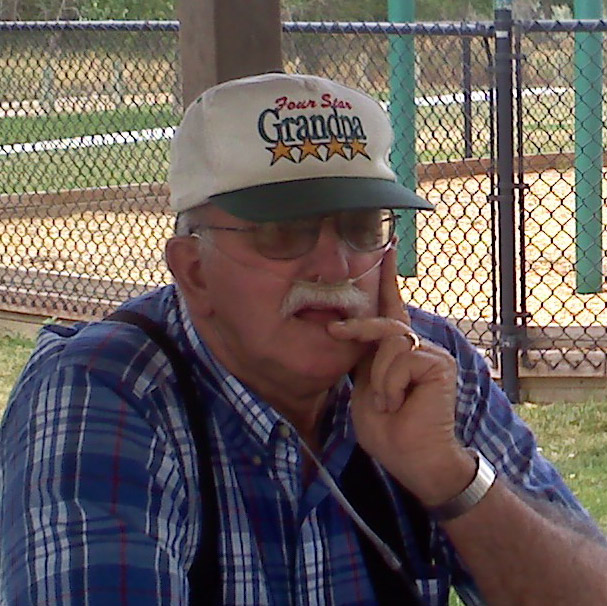 Nevertheless, as with most families, people get busy and we don’t get to see each other as often as we would like. After a while it comes down to a family picnic and a Christmas party…along with occasionally bumping into each other around town. It’s funny how it seems like as we get older, instead of meeting our friends and family at a bar, we meet up at Walmart. At least that is where Bob and I seem to see all of our family and friends. And, that is where we saw Aunt Bonnie and Uncle Jack. It was always a treat to run into them, and get to visit and laugh together. They were always so good together and so much fun. Their love for each other was so obvious. It makes me sad that Uncle Jack is gone from us now. Today would have been Uncle Jack’s 80th birthday. Happy birthday in Heaven Uncle Jack. We love and miss you very much.
Nevertheless, as with most families, people get busy and we don’t get to see each other as often as we would like. After a while it comes down to a family picnic and a Christmas party…along with occasionally bumping into each other around town. It’s funny how it seems like as we get older, instead of meeting our friends and family at a bar, we meet up at Walmart. At least that is where Bob and I seem to see all of our family and friends. And, that is where we saw Aunt Bonnie and Uncle Jack. It was always a treat to run into them, and get to visit and laugh together. They were always so good together and so much fun. Their love for each other was so obvious. It makes me sad that Uncle Jack is gone from us now. Today would have been Uncle Jack’s 80th birthday. Happy birthday in Heaven Uncle Jack. We love and miss you very much.
 Years ago, when my husband, Bob had just started his first job, his family took a trip to California. It was to be the first time Bob didn’t go along on the family vacations, and I’m sure it felt odd to the whole family, but perhaps none so much as his little brother, Ron. As the only two boys in a family of six kids, Bob and his little brother had a bond…or maybe it was simply the need for an ally. Two boys against four girls doesn’t always bode well for the boys…especially when two or all of them are older than you. Bob has two older sisters, and two younger sisters, and finally 14 years after his own birth, Bob got his little brother, Ron. Needless to say, the girls dominated the household for the most part, and for most of Bob’s life at home.
Years ago, when my husband, Bob had just started his first job, his family took a trip to California. It was to be the first time Bob didn’t go along on the family vacations, and I’m sure it felt odd to the whole family, but perhaps none so much as his little brother, Ron. As the only two boys in a family of six kids, Bob and his little brother had a bond…or maybe it was simply the need for an ally. Two boys against four girls doesn’t always bode well for the boys…especially when two or all of them are older than you. Bob has two older sisters, and two younger sisters, and finally 14 years after his own birth, Bob got his little brother, Ron. Needless to say, the girls dominated the household for the most part, and for most of Bob’s life at home.
The family set out for California, leaving Bob to work, and hopefully, stay out of trouble. The trip was fun filled, and as most vacations do, it went by far too fast. They were sightseeing and visiting family, and just having a great time. All this was so new to Ron, who was just a little guy, and so when the time came to start back home, he was clearly not the happiest person in the group. He wanted to stay longer. Home was boring. It meant going back to the same old everyday things…no more fun and exciting new things to see and do.
The family tried to explain to him that they had to go home. His dad had to work, and the  girls had to go back to school in the fall. Their had a house and all his toys back in Casper. Nothing seemed to work. Finally in a last ditch effort to convince Ron that they simply could not stay on vacation forever, the said that Bob would be lonely if they never came back home. Ron had seemed to have an answer for every other argument, but they thought they had him on this one…not so!! Ron was quick to solve that problem as well. He quickly explained, “Just send for him in the mail!” I’m quite sure that took them all by surprise, and while he didn’t win the war to stay on vacation, I think he might just have won that battle, I mean…how can you argue with logic like that.
girls had to go back to school in the fall. Their had a house and all his toys back in Casper. Nothing seemed to work. Finally in a last ditch effort to convince Ron that they simply could not stay on vacation forever, the said that Bob would be lonely if they never came back home. Ron had seemed to have an answer for every other argument, but they thought they had him on this one…not so!! Ron was quick to solve that problem as well. He quickly explained, “Just send for him in the mail!” I’m quite sure that took them all by surprise, and while he didn’t win the war to stay on vacation, I think he might just have won that battle, I mean…how can you argue with logic like that.

